Alice's Adventures in Wonderland is a timeless story that has captivated readers of all ages since it was first penned by Lewis Carroll in 1865. This enchanting tale follows a young girl named Alice as she falls through a rabbit hole into a fantastical world filled with peculiar creatures and whimsical adventures. Alice was beginning to get very tired of sitting by her sister on the bank, and of having nothing to do: once or twice she had peeped into the book her sister was reading, but it had no pictures or conversations in it. So she was considering in her own mind, as well as she could, whether the pleasure of making a daisy chain would be worth the trouble of getting up and picking the daisies, when suddenly a White Rabbit with pink eyes ran close by her. There was nothing very remarkable in that, nor did Alice think it so very much out of the way to hear the Rabbit say to itself, "Oh dear! Oh dear! I shall be late!" but when the Rabbit actually took a watch out of its waistcoat pocket, Alice started to her feet, for it flashed across her mind that she had never before seen a rabbit with either a waistcoat pocket or a watch to take out of it, and burning with curiosity, she ran across the field after it, and was fortunate enough to slip down a rabbit hole without a moment to spare. Down, down, down. Would the fall *never* come to an end? "I wonder how many miles I've fallen by this time?" she said aloud. Presently, she began again. "I wonder if I shall fall right *through* the earth! How funny it'll seem to come out among the people that walk with their heads downward! The Antipathies, I think—" (she was rather glad there was no one listening, this time, as it didn't sound at all the right word) "—but I shall have to ask them what the name of the country is, you know. Please, Ma'am, is this New Zealand or Australia?" (and she tried to curtsey as she spoke—fancy *curtseying* as you're falling through the air! Do you think you could manage it?) Down, down, down. There was nothing else to do, so Alice soon began talking again. "Dinah'll miss me very much to-night, I should think!" (Dinah was the cat.) "I hope they'll remember her saucer of milk at tea-time. Dinah, my dear, I wish you were down here with me!" Alice felt that she was dozing off, and had just begun to dream that she was walking hand in hand with Dinah, and was saying to her, very earnestly, "Now, Dinah, tell me the truth: did you ever eat a bat?" when suddenly, thump! thump! down she came upon a heap of sticks and dry leaves, and the fall was over. Alice was not a bit hurt, and she jumped up on to her feet in a moment: she looked up, but it was all dark overhead; before her was another long passage, and the White Rabbit was still in sight, hurrying down it. There was not a moment to be lost: away went Alice like the wind, and was just in time to hear it say, as it turned a corner, "Oh my ears and whiskers, how late it's getting!" She was close behind it when she turned the corner, but the Rabbit was no longer to be seen: she found herself in a long, low hall, which was lit up by a row of lamps hanging from the roof. There were doors all round the hall, but they were all locked; and when Alice had been all the way down one side and up the other, trying every door, she walked sadly down the middle, wondering how she was ever to get out again. Suddenly she came upon a little three-legged table, all made of solid glass; there was nothing on it except a tiny golden key, and Alice's first thought was that it might belong to one of the doors of the hall; but alas! either the locks were too large, or the key was too small, but at any rate it would not open any of them. However, on the second time round, she came upon a low curtain she had not noticed before, and behind it was a little door about fifteen inches high: she tried the little golden key in the lock, and to her great delight it fitted! Alice opened the door and found that it led into a small passage, not much larger than a rat-hole: she knelt down and looked along the passage into the loveliest garden you ever saw. How she longed to get out of that dark hall, and wander about among those beds of bright flowers and those cool fountains, but she could not even get her head through the doorway; "and even if my head would go through," thought poor Alice, "it would be of very little use without my shoulders. Oh, how I wish I could shut up like a telescope! I think I could, if I only know how to begin." For, you see, so many out-of-the-way things had happened lately, that Alice had begun to think that very few things indeed were really impossible. There seemed to be no use in waiting by the little door, so she went back to the table, half hoping she might find another key on it, or at any rate a book of rules for shutting people up like telescopes: this time she found a little bottle on it ("which certainly was not here before," said Alice,) and round the neck of the bottle was a paper label, with the words "DRINK ME" beautifully printed on it in large letters. It was all very well to say "Drink me," but the wise little Alice was not going to do *that* in a hurry. "No, I'll look first," she said, "and see whether it's marked *poison* or not"; for she had read several nice little histories about children who had got burnt, and eaten up by wild beasts and other unpleasant things, all because they *would* not remember the simple rules their friends had taught them: such as, that a red-hot poker will burn you if you hold it too long; and that if you cut your finger *very* deeply with a knife, it usually bleeds; and she had never forgotten that, if you drink much from a bottle marked "poison," it is almost certain to disagree with you, sooner or later. However, this bottle was *not* marked "poison," so Alice ventured to taste it, and finding it very nice, (it had, in fact, a sort of mixed flavour of cherry-tart, custard, pineapple, roast turkey, toffee, and hot buttered toast,) she very soon finished it off. And so it was indeed: she was now only ten inches high, and her face brightened up at the thought that she was now the right size for going through the little door into that lovely garden. First, however, she waited for a few minutes to see if she was going to shrink any further: she felt a little nervous about this; "for it might end, you know," said Alice to herself, "in my going out altogether, like a candle. I wonder what I should be like then?" And she tried to fancy what the flame of a candle is like after the candle is blown out, for she could not remember ever having seen such a thing. After a while, finding that nothing more happened, Alice decided on going into the garden at once; but alas for poor Alice! when she got to the door, she found she had forgotten the little golden key, and when she went back to the table for it, she found she could not possibly reach it: she could see it quite plainly through the glass, and she tried her best to climb up one of the legs of the table, but it was too slippery; and when she had tired herself out with trying, the poor little thing sat down and cried. Alice soon came across a large mushroom, and sitting on it was a blue caterpillar smoking a hookah. The caterpillar looked at Alice with an expression of indifference and asked, “Who are you?” Alice replied, “I hardly know, sir, just at present—at least I know who I was when I got up this morning, but I think I must have changed several times since then.” “What do you mean by that?” said the caterpillar sternly. “Explain yourself!” “I can’t explain myself, I’m afraid, sir,” said Alice, “because I’m not myself, you see.” “I don’t see,” said the caterpillar. “Well, perhaps you haven’t found it so yet,” said Alice; “but when you have to turn into a chrysalis—you will someday, you know—and then after that into a butterfly, I should think you’ll feel it a little queer, won’t you?” “Not a bit,” said the caterpillar. “Well, perhaps your feelings may be different,” said Alice; “all I know is, it would feel very strange to me.” “You!” said the caterpillar contemptuously. “Who are you?” Which brought them back again to the beginning of the conversation. Alice felt a little irritated at the caterpillar’s making such very short remarks, and she drew herself up and said very gravely, “I think, you ought to tell me who you are, first.” “Why?” said the caterpillar. Here was another puzzling question; and as Alice could not think of any good reason, and as the caterpillar seemed to be in a very unpleasant state of mind, she turned away. “Come back!” the caterpillar called after her. “I’ve something important to say!” This sounded promising, certainly. Alice turned and came back again. “Keep your temper,” said the caterpillar. “Is that all?” said Alice, swallowing down her anger as well as she could. “No,” said the caterpillar. Alice thought she might as well wait, as she had nothing else to do, and perhaps after all it might tell her something worth hearing. For some minutes it puffed away without speaking, but at last, it unfolded its arms, took the hookah out of its mouth again, and said, “So you think you’re changed, do you?” “I’m afraid I am, sir,” said Alice. “I can’t remember things as I used—and I don’t keep the same size for ten minutes together!” “Can’t remember what things?” said the caterpillar. “Well, I’ve tried to say ‘How doth the little busy bee,’ but it all came different!” Alice replied in a very melancholy voice. “Repeat ‘You are old, Father William,’” said the caterpillar. Alice folded her hands, and began: "You are old, Father William," the young man said, "And your hair has become very white; And yet you incessantly stand on your head— Do you think, at your age, it is right?" "In my youth," Father William replied to his son, "I feared it might injure the brain; But, now that I’m perfectly sure I have none, Why, I do it again and again." "You are old," said the youth, "as I mentioned before, And have grown most uncommonly fat; Yet you turned a back-somersault in at the door— Pray, what is the reason of that?" "In my youth," said the sage, as he shook his grey locks, "I kept all my limbs very supple By the use of this ointment—one shilling the box— Allow me to sell you a couple?" "You are old," said the youth, "and your jaws are too weak For anything tougher than suet; Yet you finished the goose, with the bones and the beak— Pray, how did you manage to do it?" "In my youth," said his father, "I took to the law, And argued each case with my wife; And the muscular strength, which it gave to my jaw, Has lasted the rest of my life." "You are old," said the youth, "one would hardly suppose That your eye was as steady as ever; Yet you balanced an eel on the end of your nose— What made you so awfully clever?" "I have answered three questions, and that is enough," Said his father. "Don’t give yourself airs! Do you think I can listen all day to such stuff? Be off, or I’ll kick you down stairs!" “That is not said right,” said the caterpillar. “Not quite right, I’m afraid,” said Alice timidly; “some of the words have got altered.” “It is wrong from beginning to end,” said the caterpillar decidedly, and there was silence for some minutes. The caterpillar was the first to speak. “What size do you want to be?” it asked. “Oh, I’m not particular as to size,” Alice hastily replied; “only one doesn’t like changing so often, you know.” “I don’t know,” said the caterpillar. Alice said nothing: she had never been so much contradicted in all her life before, and she felt that she was losing her temper. “Are you content now?” said the caterpillar. “Well, I should like to be a little larger, sir, if you wouldn’t mind,” said Alice: “three inches is such a wretched height to be.” “It is a very good height indeed!” said the caterpillar angrily, rearing itself upright as it spoke (it was exactly three inches high). “But I’m not used to it!” pleaded poor Alice in a piteous tone. And she thought to herself, “I wish the creatures wouldn’t be so easily offended!” “You’ll get used to it in time,” said the caterpillar; and it put the hookah into its mouth and began smoking again. This time Alice waited patiently until it chose to speak again. In a minute or two, the caterpillar took the hookah out of its mouth and yawned once or twice, and shook itself. Then it got down off the mushroom, and crawled away in the grass, merely remarking as it went, “One side will make you grow taller, and the other side will make you grow shorter.” “One side of what? The other side of what?” thought Alice to herself. “Of the mushroom,” said the caterpillar, just as if she had asked it aloud; and in another moment it was out of sight. Alice remained looking thoughtfully at the mushroom for a minute, trying to make out which were the two sides of it; and as it was perfectly round, she found this a very difficult question. However, at last she stretched her arms round it as far as they would go, and broke off a bit of the edge with each hand. “And now which is which?” she said to herself, and nibbled a little of the right-hand bit to try the effect: the next moment she felt a violent blow underneath her chin: it had struck her foot! She was a good deal frightened by this very sudden change, but she felt that there was no time to be lost, as she was shrinking rapidly; so she set to work at once to eat some of the other bit. Her chin was pressed so closely against her foot, that there was hardly room to open her mouth; but she did it at last, and managed to swallow a morsel of the left-hand bit. “Come, my head’s free at last!” said Alice in a tone of delight, which changed into alarm in another moment, when she found that her shoulders were nowhere to be found: all she could see, when she looked down, was an immense length of neck, which seemed to rise like a stalk out of a sea of green leaves that lay far below her. “What *can* all that green stuff be?” said Alice. “And where *have* my shoulders got to? And oh, my poor hands, how is it I can’t see you?” She was moving them about as she spoke, but no result seemed to follow, except a little shaking among the distant green leaves. As there seemed to be no chance of getting her hands up to her head, she tried to get her head down to them, and was delighted to find that her neck would bend about easily in any direction, like a serpent. She had just succeeded in curving it down into a graceful zigzag, and was going to dive in among the leaves, which she found to be nothing but the tops of the trees under which she had been wandering, when a sharp hiss made her draw back in a hurry: a large pigeon had flown into her face, and was beating her violently with its wings. “Serpent!” screamed the pigeon. “I’m *not* a serpent!” said Alice indignantly. “Let me alone!” “Serpent, I say again!” repeated the pigeon, but in a more subdued tone, and added with a kind of sob, “I’ve tried every way, and nothing seems to suit them!” “I haven’t the least idea what you’re talking about,” said Alice. “I’ve tried the roots of trees, and I’ve tried banks, and I’ve tried hedges,” the pigeon went on, without attending to her; “but those serpents! There’s no pleasing them!” Alice was more and more puzzled, but she thought there was no use in saying anything more till the pigeon had finished. “As if it wasn’t trouble enough hatching the eggs,” said the pigeon; “but I must be on the lookout for serpents night and day! Why, I haven’t had a wink of sleep these three weeks!” “I’m very sorry you’ve been annoyed,” said Alice, who was beginning to see its meaning. “And just as I’d taken the highest tree in the wood,” continued the pigeon, raising its voice to a shriek, “and just as I was thinking I should be free of them at last, they must needs come wriggling down from the sky! Ugh, serpent!” “But I’m *not* a serpent, I tell you!” said Alice. “I’m a—I’m a—” “Well! *What* are you?” said the pigeon. “I can see you’re trying to invent something!” “I—I’m a little girl,” said Alice, rather doubtfully, as she remembered the number of changes she had gone through that day. “A likely story indeed!” said the pigeon in a tone of the deepest contempt. “I’ve seen a good many little girls in my time, but never one with such a neck as that! No, no! You’re a serpent; and there’s no use denying it. I suppose you’ll be telling me next that you never tasted an egg!” “I *have* tasted eggs, certainly,” said Alice, who was a very truthful child; “but little girls eat eggs quite as much as serpents do, you know.” “I don’t believe it,” said the pigeon; “but if they do, why then they’re a kind of serpent, that’s all I can say.” This was such a new idea to Alice, that she was quite silent for a minute or two, which gave the pigeon the opportunity of adding, “You’re looking for eggs, I know *that* well enough; and what does it matter to me whether you’re a little girl or a serpent?” “It matters a good deal to *me*,” said Alice hastily; “but I’m not looking for eggs, as it happens; and if I was, I shouldn’t want *yours*: I don’t like them raw.” “Well, be off, then!” said the pigeon in a sulky tone, as it settled down again into its nest. Alice crouched down among the trees as well as she could, for her neck kept getting entangled among the branches, and every now and then she had to stop and untwist it. After a while she remembered that she still held the pieces of mushroom in her hands, and she set to work very carefully, nibbling first at one and then at the other, and growing sometimes taller and sometimes shorter, until she had succeeded in bringing herself down to her usual height. It was so long since she had been anything near the right size, that it felt quite strange at first; but she got used to it in a few minutes, and began talking to herself, as usual. “Come, there’s half my plan done now! How puzzling all these changes are! I’m never sure what I’m going to be, from one minute to another! However, I’ve got back to my right size: the next thing is, to get into that beautiful garden—how *is* that to be done, I wonder?” As she said this, she came suddenly upon an open place, with a little house in it about four feet high. “Whoever lives there,” thought Alice, “it’ll never do to come upon them *this* size: why, I should frighten them out of their wits!” So she began nibbling at the right-hand bit again, and did not venture to go near the house till she had brought herself down to nine inches high. After a short walk through the forest, Alice reached a clearing with a large, ornate garden. At its center stood a grand croquet ground, surrounded by hedges and fountains. The Queen of Hearts was there, along with her entourage. Alice was invited to join the game, which was played with live flamingos as mallets and hedgehogs as balls. It was a chaotic and confusing game, and the Queen was quick to issue orders for beheadings at the slightest provocation. Amidst the chaos, Alice met the Gryphon, who took her to see the Mock Turtle. The Mock Turtle told Alice his sorrowful story about his schooldays under the sea, singing songs and recounting tales of his past. Alice listened patiently, finding the whole situation both sad and amusing. The Gryphon led Alice back to the croquet ground, where a trial was about to begin. The Knave of Hearts was accused of stealing the Queen’s tarts. Alice was called to give evidence, but her size kept changing, making her feel awkward and out of place. The trial was a farce, with nonsensical proceedings and absurd characters. As the trial reached its climax, Alice found herself growing larger and larger. She challenged the court’s authority, and in the midst of the commotion, she realized that the creatures were nothing but a pack of cards. The cards rose up and came flying down upon her, and she gave a little scream and woke up, finding herself back on the riverbank, her sister gently brushing away some leaves that had fluttered down from the trees onto her face. Alice sat up and rubbed her eyes, realizing that she had been dreaming. Her sister asked her what the dream was about, and Alice began to recount the wonderful adventures she had in Wonderland. As she spoke, her sister listened with a smile, imagining the strange and delightful world Alice had described. Alice’s adventures left a lasting impression on her, filling her with a sense of wonder and curiosity. She vowed to return to Wonderland one day, eager to explore more of its fantastical realms and meet its extraordinary inhabitants once again. As Alice and her sister walked home, the sun began to set, casting a warm glow over the landscape. Alice couldn’t help but feel that, even in the ordinary world, magic and adventure were never too far away, waiting just around the corner for those with the imagination to see it.Alice's Adventures in Wonderland
Down the Rabbit Hole
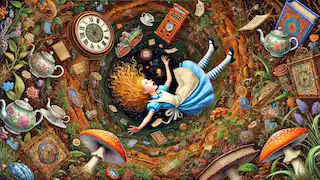
A Curious Hall
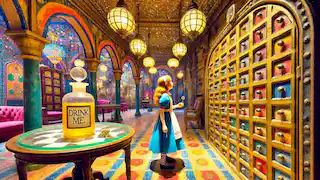
The Pool of Tears
*"What a curious feeling!" said Alice; "I must be shutting up like a telescope."*
Alice Meets the Caterpillar
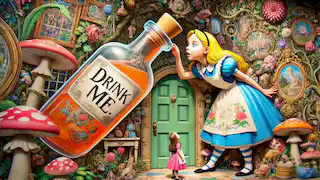
Advice from a Caterpillar
Alice and the Cheshire Cat
A Mad Tea Party
The Queen's Croquet-Ground
Alice’s Evidence
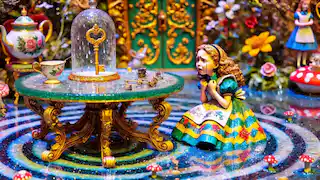
Back to Reality
Alice's Adventures in Wonderland
Reading Time: 20 min
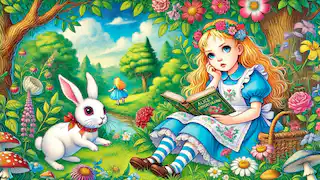
About Story: Alice's Adventures in Wonderland is a Fantasy Stories from canada set in the 19th Century Stories. This Descriptive Stories tale explores themes of Coming of Age Stories and is suitable for All Ages Stories. It offers Entertaining Stories insights. A whimsical journey into a fantastical world.


















